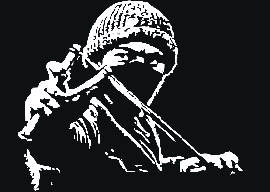
March 24, 2011

Four young men in black-denim jackets and hoodies closed in when the man they”d been waiting for emerged from the Mecklenburg Government Center. One of them yelled, “Jared Taylor, you”re a f———asshole!” Reporters turned shocked faces toward the protesters. The police stood their ground, alert but expressionless. Dressed in a suit and overcoat, Jared Taylor shrugged and continued. He”d heard it all before.
The protesters glared from the crowd’s rear as they listened to Taylor address reporters. Taylor demanded an apology from Patrick Cannon, Charlotte’s Mayor Pro Tem, who had pressured local hotels to deny Taylor, a self-described “racial realist,” a conference room for his organization, American Renaissance.
When Taylor concluded his remarks, the reporters turned to the black-garbed protesters, who identified themselves as members of the Anti-Racist Action Network. All four were white. One of them, Michael Behrle, boasted, “American Renaissance will not hold a convention in Charlotte. If they try, it”ll be just like Canada,” referring to Taylor’s talk in Halifax in January, 2007, which protesters effectively canceled by physically removing Taylor from the meeting hall.
I had interviewed Michael Behrle minutes earlier, having spotted his anti-Nazi arm patch. Twenty-two, white, with reddish-brown hair and a short beard, Behrle heads the Charlotte, North Carolina branch of Anti-Racist Action. He’s a barista who enters latte art competitions. I asked him why he”d come.
“We”re here to show Jared Taylor we”re not going to allow him to take away our rights.”
“But Taylor’s group just makes speeches about immigration.”
Behrle’s jaw clenched. “That’s because they”re white supremacists. They want to bring back segregation, and that’s simply not going to happen. Our action here will show other fascists they”re not welcome in Charlotte.”
Fascists? I wanted to probe more, but he shook his head and turned back toward the other protesters, his eyes fixed on me as he walked away.
For Michael Behrle and many others like him, those are the battle lines in post-Cold War, multicultural America: on one side, fascists, and opposing them, the antifa. The word “antifa” comes from Antifaschismus, the German term for anti-fascism. Dressed in their preferred street garb of black clothes, boots, balaclavas, and anti-Nazi patches are young people, almost all white, driven by an ideology as powerful and magnetic as communism. French philosopher Alain Finkielkraut has warned, “I think that the lofty idea of “the war on racism” is gradually turning into a hideously false ideology. And this anti-racism will be for the 21st century what communism was for the 20th century: a source of violence.”
What’s frightening is that antifa believe conservatives, immigration-control activists, and Tea Party protesters are clandestine fascists. Behrle’s group, Anti-Racist Action, makes this explicit on its website:
“The National Socialist Movement and similar open fascist forces are seeking greater political legitimacy. They want greater influence within larger white nationalist and reactionary social and political forces, such as the anti-immigrant movement, the “tea-baggers,” and the re-emerging militia movement.”